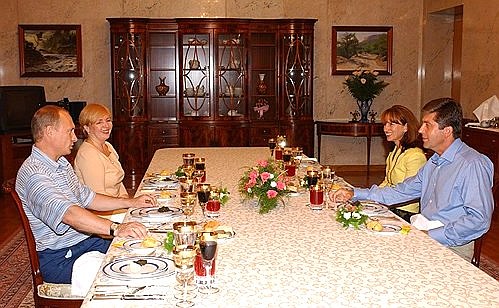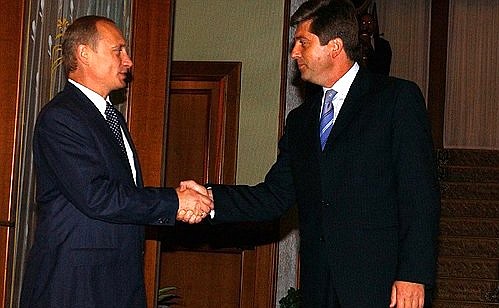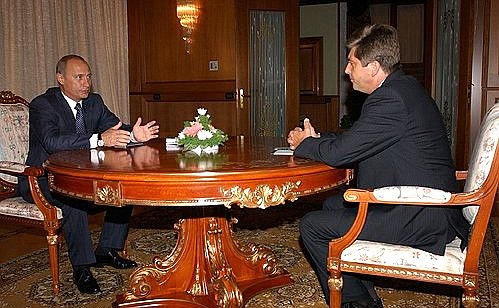Mr Putin and Mr Parvanov discussed the prospects for bilateral cooperation in the trade, economic, energy, humanitarian and tourism spheres and exchanged opinions on current international issues. Among other things, they discussed the situation in the Balkans and some aspects of the European Union enlargement.
During the talks, President Putin spoke highly about the positive development of political contacts at the top level and said that the revival of Russian-Bulgarian relations should be translated into real economic results. He said that bilateral trade had reached $1.4 billion during the last year, but there were some problems with its content and structure. The Russian President believes that the implementation of joint projects in the field of engineering and light industry can help overcome the existing trade imbalance.
Mr Parvanov described the 30–40% increase of Russian tourists travelling to Bulgaria as a positive element and expressed confidence that reviving spiritual and cultural ties would drive economic contacts.
Mr Putin said that Russia was looking forward to seeing President Parvanov in late September to take part in the opening of the Bulgarian Culture Days in Russia. He also invited the Bulgarian President to come to Russia again on an official visit in 2004.
The two leaders made statements to the press and answered journalists’ questions after the talks.
Russia is ready to render the necessary support to Bulgaria during its forthcoming presidency of the Organisation for Security and Cooperation in Europe, President Putin said at the news conference. He spoke in favour of the diversification of OSCE activities in order to not confine itself to regional problems – which are limited in scope, though important – and meet the original purpose of the OSCE.
He also expressed confidence that the integration of Bulgaria into the European Union would not create new obstacles in the way of bilateral relations.
The Russian President touched upon some acute regional problems whose solution, in his opinion, required concerted international efforts. The Russian leader said that the problem of Kosovo loomed large in the negotiations. Recalling that the world community had reacted actively to the exodus of 25,000–40,000 Albanian refugees from Kosovo, President Putin stressed that it was wrong and unacceptable to ignore the fact that 200,000 Serbs had left their homes and were unable to return.
The journalists were interested in the two countries’ cooperation in the energy sector. Mr Putin expressed hope that Russian companies would take an active part in energy projects in Bulgaria. In particular, he recalled that the Kozloduy Nuclear Power Plant had been built with the technical assistance of the former USSR and now that the modernisation of two of its units was under discussion, Russia’s proposals were much more attractive for Bulgaria than the offers of other European partners. And in terms of security and effectiveness these proposals fully meet world standards, the President stressed.
According to the Russian leader, Russia intends to increase the transit of gas to Bulgaria and take part in privatising the power generating capacity and also work on power transmission networks. Russia is also ready to resume power supplies via Ukraine and Moldova, President Putin said.


